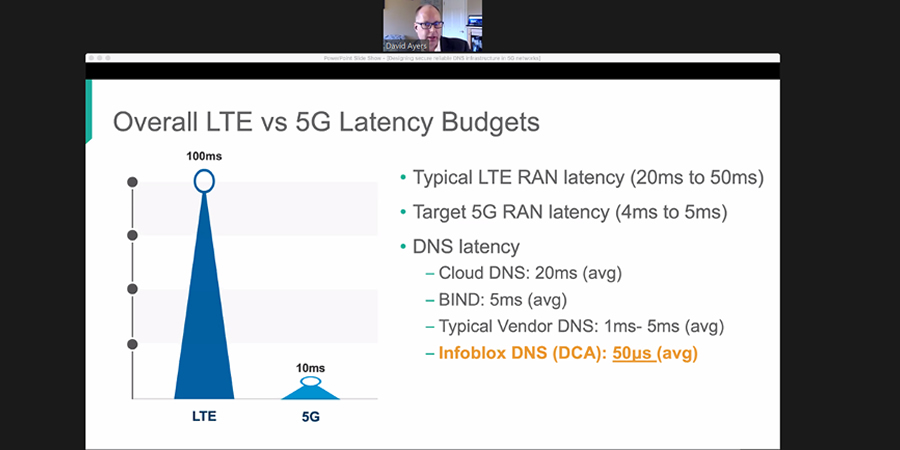David Ayers, product marketing manager, Infoblox gave a keynote presentation at the Infoblox SP virtual summit organized by Telecom Review. The keynote highlighted the critical DNS requirements for 5G.
“DNS has become a crucial resource that operators need to manage and distribute just like other critical network functions, says Ayers. DNS role in taking any application or service function request, mapping the IP address and associating that with an active resource becomes very critical to the dynamic nature of 5G.”
Infoblox product marketing manager examined 6 critical DNS design requirements for 5G:
- Low latency
- Scaling by orders of magnitude
- Network-wide awareness
- Edge security
- Secure high-performance control plane
- Real-time monitoring and management
- Flexibility
5G use cases will require extremely low latency. DNS and latency are tightly coupled. Having the fastest DNS response is critical to subscribers’ network quality. When comparing 5G vs LTE latency budget for DNS, Ayers highlighted that “Infoblox DNS is designed to handle future 5G and edge based applications that require this ultra-low latency.”
Telcos have been operating in the virtual machine mode, but now we’re moving to cloud-native microservices. Without cloud-native virtual DNS, operators may find it almost impossible to scale DNS in real time for 5G. “Having a reliable DNS will be a critical foundation for a service-based architecture”, he said.
“We need an IP address management system to manage all of this. In 4G, this was handled in the packet gateway or even maintained manually in some cases. However, now we’re in the real-time world of container management,” explained David Ayers when talking about network-wide awareness.
“Infoblox IP address management system is key to provision IP addresses in a fast way”, he added.
When it comes to security, thousands of new locations increase the potential for security threats both from third-party applications at the edge. DNS can be leveraged to block many types of attacked at the edge before they advance further.
“There are many pitfalls in firewalls, and they sometimes block an attack after it is happening. That is why DNS has to become an enhanced security function and become a critical part of revenues for CSPS”, Ayers outlined.
Infoblox product marketing manager then tackled how DoT and DoH can create problems to service providers. “While DoT and DoH were designed to address DNS privacy issues for consumers, they introduced some DNS behavior changes to how browsers function. These changes create a lot of digital complexity and unintended network consequences for the providers.”
The last criteria David Ayers addressed was real-time monitoring and management. For multi-domain networking, it is critical to have DNS monitor and operate seamlessly in real time across those multiple domains via a common control panel. This will pave the way to a multi-cloud world. In this context, he mentioned Infoblox telco cloud solutions which support telco cloud computing growth and expansion.
One last criteria is flexibility. Service providers require flexibility with simple pay-as-you-grow licensing that supports edge-based growth.










